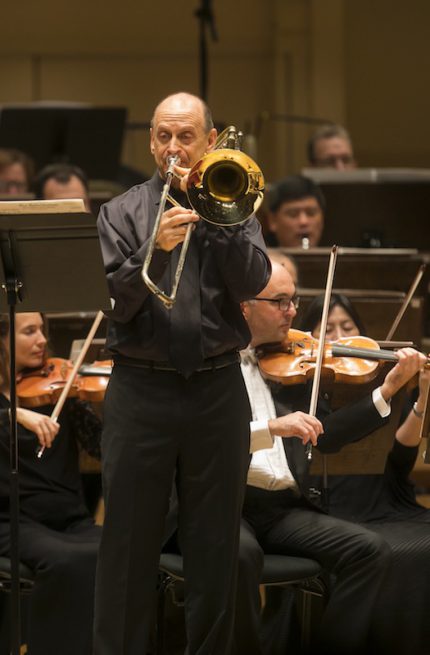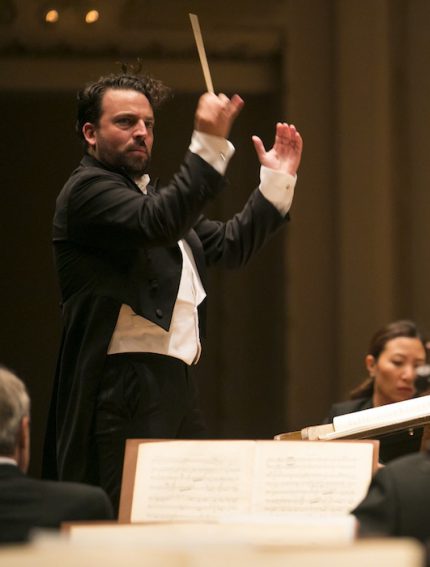No illusions about successful Vine premiere from Mulcahy, CSO

Give credit where credit is due. After a 125th anniversary season in which the Chicago Symphony Orchestra performed just a single new work (another had fallen through), the CSO is presenting no less than four world premieres in 2016-17, all commissioned in whole or part by the orchestra. Programming director Cristina Rocca, who came aboard in March of 2015, deserves plaudits for bringing the CSO back into the 21st century.
The first premiere of the season was heard Thursday night with the debut of Carl Vine’s Five Hallucinations, a trombone concerto written for Michael Mulcahy, a stalwart component of the CSO brass section for over a quarter-century.
A co-commission with the Sydney Symphony Orchestra, Vine’s work was inspired by writings of the late neurologist and best-selling author Oliver Sacks, particularly his Hallucinations, which examines a wide variety of sensory deceptions, both natural and chemically induced.
Five Hallucinations is cast in five connected sections running 20 minutes and played without pause, each segment suggesting a different auditory illusion.
That would deem to presage a grimly dour experience. Yet, while there are passing shadows to be sure, much of the music, like Sacks’ books, is cast in a populist and approachable idiom–reflecting the compensatory, often cheerful illusions that allow people to live out their lives every day.
Five Hallucinations is an impressive, surely crafted work, deftly deploying atmospheric and virtuosic writing for solo trombone against a large orchestra. There are many imaginative touches by the Australian composer: in “The doppelganger” Mulcahy’s unsettled solo line is shadowed by his trombone colleagues in the orchestra, reflecting the hallucination of being followed. “The lemonade speaks” is suitably whimsical with buoyant passages for the soloist and nice scoring touches, as with the waterfall-like piccolo and harp. A darker world emerges in “Mama wants some cookies” as the sharply rhythmic music turns frantic and aggressive. The concerto closes on an optimistic note (“Hexagons in pink”) with Vine’s energetic, brightly colored scoring reflecting the soothing pleasure of repetitive visual patterns, even with passing moments of existential fear.
One could hardly have imagined a more successful world premiere. Michael Mulcahy gave a fleet and authoritative reading, the tall trombonist playing with faultless technical sheen, elegant tone and a strikingly wide and graceful dynamic range.
Gaffigan’s direction was just as exemplary, balancing the large forces skillfully against the soloist, allowing Vine’s colorful writing to register clearly, and drawing dynamic and responsive playing from the orchestra. One can easily see Five Hallucinations being picked up and performed widely as a fine addition to the scant trombone concerto repertory. Both soloist and composer were warmly applauded by the audience.
The evening began with Cesar Franck’s Le chausseur maudit or The Accursed Huntsman, one of the Belgian composer’s handful of works for orchestra. The scenario relates the tale of a royal who goes hunting on Sunday, despite warnings about doing so on the Sabbath, and meets a tragic fate. Franck’s symphonic poem mixes some of the dark, primeval forest mystery of Weber with the kaleidoscopic scoring of Berlioz.
Gaffigan led a full-blooded account that largely skirted bombast. There was notably evocative horn playing in the opening section, hard-driving excitement in the equestrian episodes and skillful weaving of the restless string and wind dynamics by Gaffigan.
Along with Beethoven and Brahms. Prokofiev is the spotlighted composer this season, marking the Russian composer’s 125th birthday anniversary. Of Prokofiev’s nine ballets, Romeo and Juliet is the only one to achieve a permanent place in the repertory. (Michael Tilson Thomas will conduct excerpts from that beloved work with the CSO in December.)
Less often heard is music from Prokofiev’s Cinderella, which took up the entire second half of the program. While the 1945 ballet isn’t nearly as musically indelible nor as cohesive as R&J, it is crafted with the composer’s characteristic flair and brilliance and deserves more hearings than it gets.
Prokofiev cobbled together three suites from Cinderella, but Gaffigan conducted his own 43-minute confection, which contains most of the best music and is more linear and dramatically effective than the composer’s potted excerpts.
If charm was a sometime thing in Thursday’s performance, the young conductor succeeded in bringing out the jumpy energy and primary hues of Prokofiev’s whipcrack orchestration. Cinderella’s lyrical theme in the Introduction went with delicate warmth, nicely contrasted with the satiric music for her evil, bickering stepsisters. The pas de deux Duet for the Prince and Cinderella was duly impassioned, and Prokofiev comical treatment of the clock ticking down to midnight and the Wagnerian cacophony and bell tolling that follows provided ample sonic spectacle.
On a week with several principals off–including most of the woodwinds—all CSO sections rose to the occasion with committed and vivid playing, especially John Bruce Yeh’s characterful clarinet contributions.
Ironically, the (excellent) guest principal trumpet Thursday night was James Ross from the Metropolitan Opera–on the same night when Christopher Martin played his first concert as a featured soloist since becoming principal of the New York Philharmonic last month.
The program will be repeated 8 p.m. Saturday. cso.org; 312-294-3000.
Posted in Performances






Posted Oct 08, 2016 at 10:27 am by Tod Verklärung
As Mr. Johnson suggests, an excellent program. The Friday repeat brought a small audience of attentive listeners. Unfortunately, the upper balcony could have been closed off and many lower balcony seats were empty, as well. No student groups were in evidence, leaving the sad state of CSO attendance undisguised.
Posted Oct 09, 2016 at 11:24 pm by sandra
It was a lovely and special evening with exceptional performances by all. Imaginative and welcomed programing of relatively underplayed works such as the Franck and Prokofiev.. Beautifully conceived and captivating performance with flawless delivery of the Vine by Michael Mulcahy, and stunning solos by John Yeh in the Prokofiev. Inspired leadership at the helm of this magnificent orchestra by James Gaffigan .
Bravo to all-a night to remember. Thank you!
Posted Dec 01, 2016 at 11:14 am by Geo.
Nice to hear about this CSO concert with the Carl Vine premiere. For Tod V.’s remark especially, that is unfortunate about the low attendance at the one performance. If it’s any consolation, we’re having the same problems on symphony attendance here in St. Louis, in general.